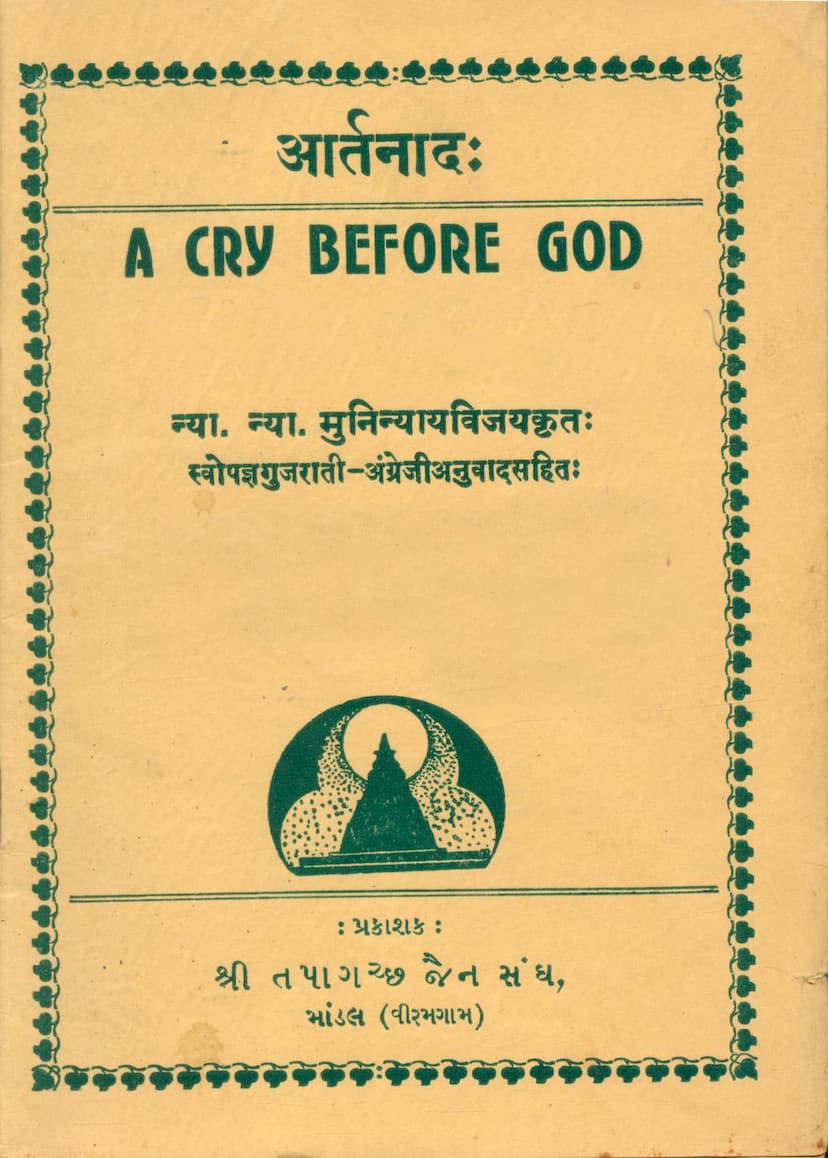Aartnad
Added to library: September 1, 2025

Summary
This document is the Jain text titled "Aartnad: A Cry Before God" (also translated as "A Cry Before God"), authored by Muni Nyayavijay. It was published by Shri Tapagaccha Jain Sangh in Bhadrapad, Vikram Samvat 2018 (1961). The book includes the original text, a Gujarati translation, and an English translation.
The text is a collection of verses (shlokas) presented as a heartfelt appeal and prayer to the divine, likely a Tirthankara or the ultimate spiritual being within Jainism. The author, Muni Nyayavijay, expresses his deep devotion, acknowledging his own weaknesses and reliance on the divine.
Here's a summary of the key themes and sentiments expressed throughout the verses:
- Absolute Reliance on the Divine: The verses repeatedly emphasize that the divine is the sole source of sustenance, support, and happiness in the universe. The author acknowledges that all his food and drink come from the divine and that he lives only by its support. (Verse 1, 2)
- The Divine as the Ultimate Refuge: The divine is portrayed as the supreme refuge and protector for all beings in all places and at all times, especially for the weak and those in need. (Verse 3)
- Self-Acknowledgement of Weakness and Limitations: The author humbly admits his own physical and mental weakness, his susceptibility to illness, and his inability to worship the divine adequately due to these limitations. (Verse 4)
- Unwavering Faith and Love: Despite his weaknesses, the author asserts his unwavering faith and love for the divine. He finds joy in remembering and praising the divine's qualities. (Verse 8)
- Plea for Mercy and Grace: A central theme is the earnest plea for divine mercy. The author acknowledges his limited abilities but begs for the divine's compassion, comparing the divine's grace to the sun's light spreading everywhere and the rain falling without discrimination. (Verse 6, 7, 8, 9, 10, 11)
- Divine Power to Transform and Elevate: The text highlights the divine's power to make the unworthy worthy, a capability that even wise humans possess to some extent. The divine is seen as the ultimate bestower of worthiness and the guide to the path of welfare and ultimate happiness. (Verse 9, 10, 11, 21, 22, 23)
- The Nature of True Success and Worth: The verses strongly assert that true success, fulfillment, and a meaningful life are impossible without the divine's grace. Even great knowledge, eloquence, or status are considered futile if not accompanied by devotion. (Verse 17, 21, 22)
- The Divine as the Source of All Good: The divine is described as the embodiment of great beauty, delight, power, and light, surpassing even the combined brilliance of thousands of suns and moons. (Verse 23, 24)
- Purification and Liberation through Devotion: The author prays to purify his mind, speech, and actions through remembering, praising, and bowing to the divine. He seeks the ability to overcome attachments, aversions, and afflictions by taking refuge in the divine and following its teachings. (Verse 25, 26)
- The Ultimate Bliss: The ultimate goal expressed is to become competent in securing the "supremacy of auspicious pleasure" (paramananda-sampad) and to reach the "ground of welfare" (kalyanabhumi). (Verse 10, 27)
- The Divine's Benevolence and Omniscience: The divine is recognized as the benefactor of the world, the revealer of the path of welfare, possessing infinite qualities, and being the knower of the entire universe, adored by all. (Verse 28-29, 30-31-32)
- Renunciation of Worldly Pursuits: The text warns against seeking refuge in worldly powers like kings or wealthy individuals, calling it foolishness when the divine, the lord of the universe, is available. (Verse 16, 19)
- The Humble Supplication: The work concludes with a profound and humble supplication, where the author, acknowledging his suffering and afflicted state, seeks compassionate attention from the divine with folded hands. (Verse 30-31-32)
In essence, "Aartnad" is a devotional work that articulates the Jain principles of pratyechanā (repentance and seeking forgiveness), bhakti (devotion), and sharanagati (surrender to the divine), emphasizing the omnipresent and omnipotent nature of the divine as the ultimate source of solace, strength, and liberation from worldly suffering.